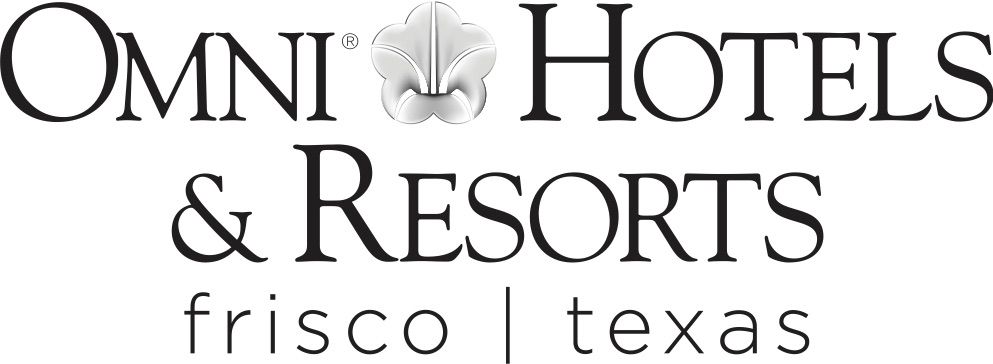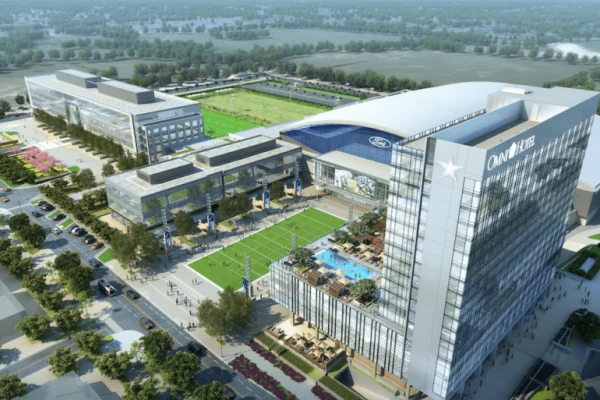THE HOST
In a contemporary building with a glass facade, this upscale hotel is a 3-minute walk from football games at The Star stadium, home of the Dallas Cowboys. It’s 14 miles from Interstate 635 and 5 miles from Hawaiian Falls amusement park.
Airy, polished rooms have Wi-Fi access, flat-screen TVs and coffeemakers. All offer floor-to-ceiling windows; some feature views of the stadium practice field. Suites add separate living areas. In-room fitness gear is available.
There’s a modern restaurant and a chic bar. A 4th-floor terrace features an outdoor infinity pool and a bar. Other amenities include a 24/7 gym and event space.
Frisco, TX
Frisco is a city in Collin and Denton counties in the U.S. state of Texas. It is part of the Dallas–Fort Worth metroplex (DFW) and about 25 miles (40 km) from both Dallas Love Field and Dallas/Fort Worth International Airport. Its population was 116,989 at the 2010 census, with the 2020 census placing it at 207,748.
Frisco was the fastest-growing city in the country in 2017,[5] and also from 2000 to 2009. In the late 1990s, the northern DFW suburban development tide hit the northern border of Plano and spilled into Frisco, sparking rapid growth into the 2000s. Like many of the cities in Dallas’s northern suburbs, Frisco serves as a bedroom community for professionals who work in DFW. Since 2003, Frisco has received the designation Tree City USA from the National Arbor Day Foundation. Frisco Independent School District, the local school district, is known for its students’ exceptional performance.
When the Dallas area was being settled by American pioneers, many of the settlers traveled by wagon trains along the Shawnee Trail. This trail became the Preston Trail, and later Preston Road. With all this activity, the community of Lebanon was founded along this trail, and was granted a U.S. post office in 1860. In 1902, a line of the St. Louis-San Francisco Railway was being built through the area, and periodic watering stops were needed along the route for the steam locomotives. The current settlement of Lebanon was on the Preston Ridge, and was too high in elevation, so the watering stop was placed about 4 miles (6 km) to the west on lower ground. A community grew around this train stop. Some Lebanon residents moved their houses to the new community on logs. The new town was originally named Emerson, but the U.S. Postal Service rejected the name as too similar to another community, Emberson, in Lamar County. In 1904, the town’s residents chose “Frisco City” in honor of the St. Louis–San Francisco Railway. This name was later shortened to Frisco.
The distinctive Frisco coat of arms is based on the St. Louis-San Francisco Railway’s logo.
TRAINING OVERVIEW
Host Company offers progressive CULINARY Arts training programs through a specific training department focus/concentration (Commissary, Garde Manger, Banquets, casual Quick Serve, Cascades Garden Upscale) & common phases may include: (See Training Plan for Specifics)
- Arrival, Orientation & Intro to American Culinary Arts
- Culinary Arts for Casual Dining, Quick Serve or Upscale
- American Techniques/Methodologies for High Volume
- Banquets, Garde Manger, Pastry, Customer Service
Depending on the specific training dept. assigned, Exchange Visitors may learn or gain experience with preparations used to make resort operations run successfully, methodologies, recipes, quality & presentation standards, oven, grill & other equipment operations, while learning productivity and time management skills. They may learn ways to be flexible with guests and gain experience with Grill, Saute’, Sushi and various stations. They may learn banquet operations and commissary storage, how to create a unique culinary experience, and how to plate & execute upscale a la carte dining.
Housing and Transportation
Your Host Organization will arrange temporary housing on-site for the first 14 days.
- Temporary Housing is not required for the job placement, but is provided by your Host Organization on-site for the first two weeks of your program for $60 per night + taxes & fees.
- Participants may be required to sign a housing agreement. By signing the program information guide and/or housing agreement, participants are agreeing to stay at housing that has been pre-arranged for the entire length of the agreement.
- Any damage to the property will result in participants paying the cost as determined by the housing management.
- Detailed housing arrangement will be disclosed by GEC prior to arrivals.
- Temporary Housing for the first 2 weeks is $60 per night + taxes and fees ($501.55 per week for 1-person occupancy and $250.78 per week for 2-person occupancy). After that point, you will be responsible for securing your own permanent housing.
- Your Host Organization will assign rooming lists based on arrival/departure dates and specific roommates may not be guaranteed.
- Your Host Organization will assign rooming lists based on arrival/departure dates and specific roommates may not be guaranteed.
- By accepting placement and signing training plan, exchange visitors assume responsibility to read the House Rules and agree to abide by all terms and conditions of this Agreement and the House Rules.
- Various Transportation options available and might include Public Transportation, Taxi/Shuttle Service, & Ride Share (Uber/Lyft).
The above information is accurate at this time but final placement arrangements are subject to change. When you have been selected, please carefully review your final placement details in your Program Information Guide. It is your responsibility to read and understand your placement details BEFORE signing your work agreement and Program Information Guide acknowledgment form that indicates the acceptance of your placement details.

